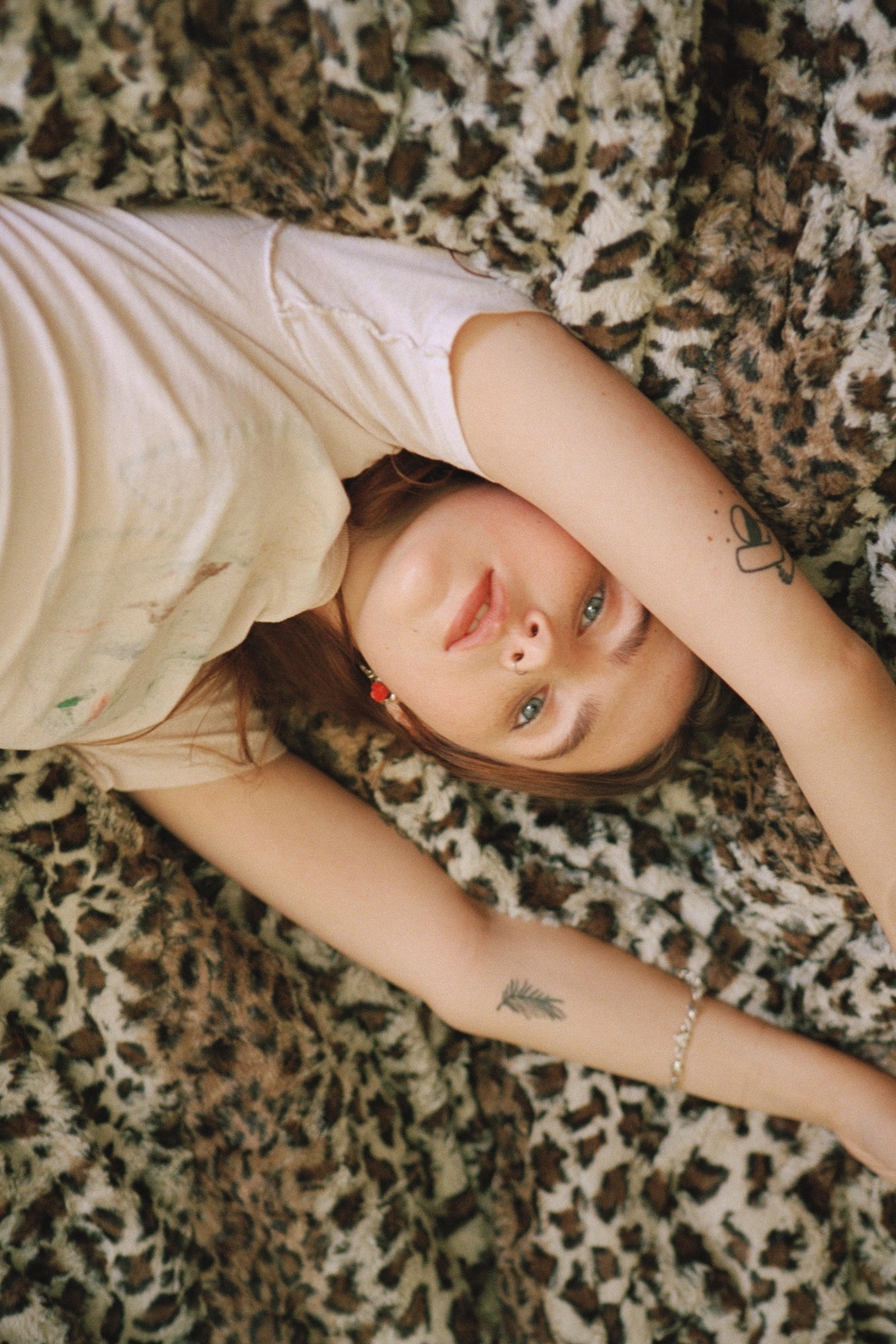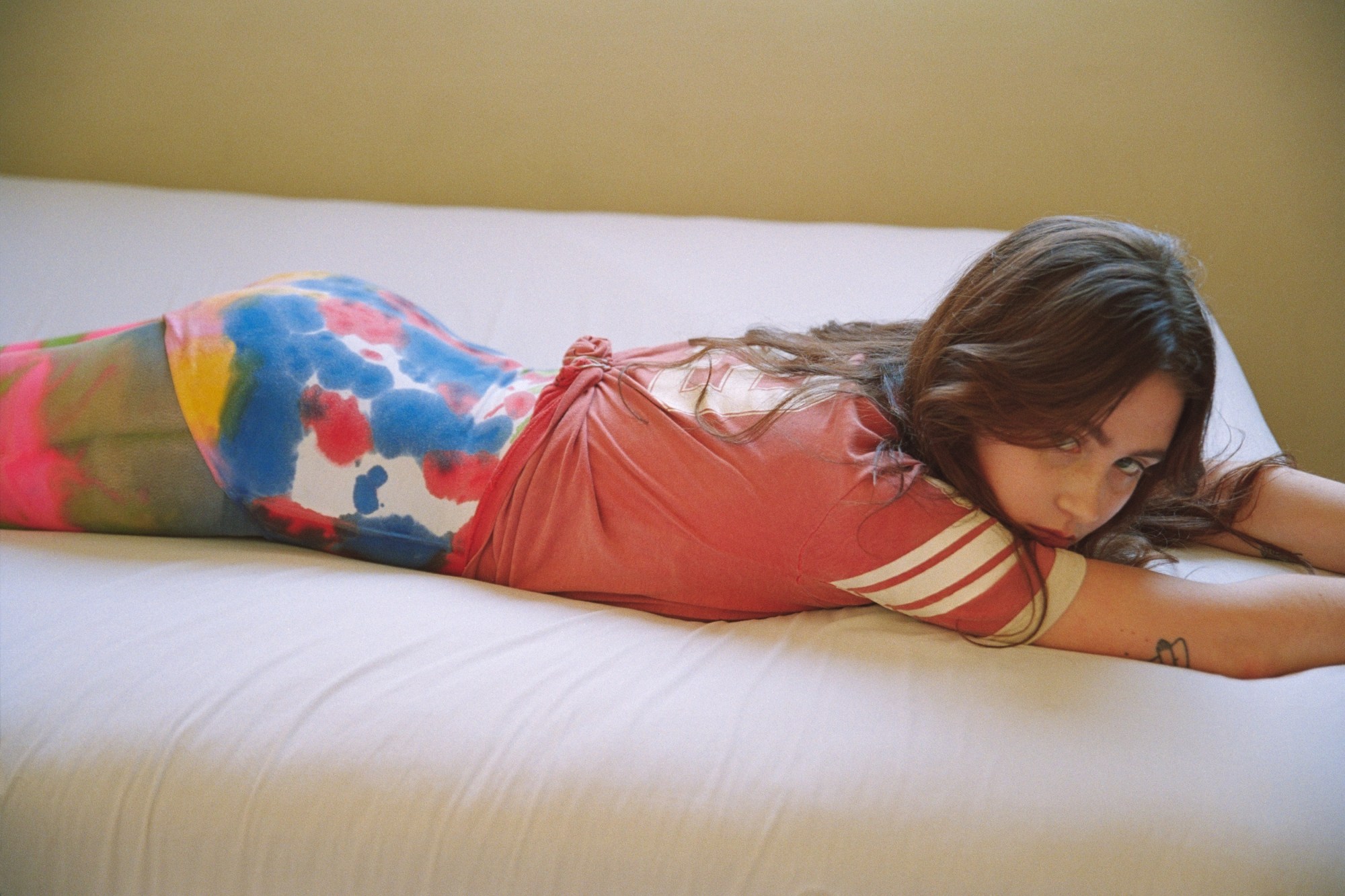Claire Cottrill was sitting in the passenger seat, driving around Los Angeles one night, when she realized she was crushing hard on the girl next to her. It was a sweet moment full of magnetism and all the while she was wondering if the feeling was mutual. At the same time, making the first move seemed like too big of a risk. This nervous feeling is something that Cottrill, better known as Clairo, is all too familiar with, having just come out in the last year, and she’s preserved this tender memory in her new song “Bags.” “Can you see me? I’m waiting for the right time/ I can’t read you, but if you want the pleasure’s all mine,” she sings. “Can you see me using everything to hold back?/ I guess this could be worse/ walking out the door with your bags.” Not only is this song the first single off of Clairo‘s debut album Immunity, out August 2, but it marks the first time the 20-year-old songwriter has opened up about her sexuality in her music.
“Before this record I wasn’t really allowing myself to make music that felt this personal… I’m continuing to learn how to open myself up more,” Clairo explains, lounging on the couch in her Airbnb in Harlem. “That’s also just growing as a person, maturing, and figuring out who you are. It’s hard to figure out who you are and what your songs are about when that all happens to you very quickly at 19.”
When Clairo says “that,” she’s referring to becoming a pop star overnight after her video “Pretty Girl” went viral in 2017. The Atlanta-born songwriter grew up on the internet, teaching herself guitar in the eighth grade using online tutorials. While she’s been quietly uploading lo-fi pop songs to Bandcamp since 2014, largely inspired by the DIY scenes in Boston and Philadelphia, when “Pretty Girl” blew up (it now has over 32 million views) it turned her life upside down. Suddenly, as a freshman at Syracuse University, Clairo was fending off major record labels, and haters alike, who questioned her self-made success.
“‘Pretty Girl’ is amazing. I’m really happy that I did it because it wouldn’t have given me anything else that I currently have,” Clairo says, still the same fresh-faced girl that sung into the camera of her laptop. “But I do think it kind of painted me as less mature than I really am. I just want people to take me more seriously because I know I have more to offer than just that.”

Clairo released a string of other viral hits, including “Flaming Hot Cheetos,” a dreamy keyboard ballad named after the snack she was eating while making the demo, and her debut EP diary.001 a year ago last May. When she set out to write new music, she had every intention of making diary.002, but working with producer and mentor Rostam Batmanglij (formerly of Vampire Weekend) felt so natural that the project quickly turned into an album. “It all just kind of fell into place. It felt like Rostam and I knew each other for years and he was able to get me to talk about things that I probably wouldn’t have spoken about,” Clairo says. “He doesn’t have an expectation of me to be anything but myself, which I think helps because I’ve felt so much pressure in the last year.”
Immunity is Clairo’s most personal album yet and just might be her best kept secret that she’s waited months to share. “The whole record is really just things I never thought I would tell anyone,” she admits. “I was given a platform and even if I’m still figuring my sexuality out, I need to be open and I need to let the world know that whatever they’re feeling, in their small town, lots of other people are also feeling.”
Clairo first alluded to her sexuality on Twitter by posting about a song on diary.001 called “B.O.M.D.,” which stands for boy of my dreams. “’B.O.M.D.’ is also ‘G.O.M.D.’ for ur information,” she wrote. “Was wondering how to ever say this publicly LOL.” The casual announcement isn’t all that different from the very Gen Z way in which Clairo’s been teasing lyrics to “Bags” and hinting about new music over the past few days.
Immunity is an ode to personal growth, a document of sexual discovery, and a series of 11 songs written so that fans can seek solace in their lyrics. “I know I don’t have to necessarily take on being a role model for younger people, but the more I look at who comes to my shows and who really pays attention to what I’m doing, it’s young people that might need someone to tell them that their feelings are normal,” Clairo explains. “I would love to act as that older sibling to them. I just want to make everyone feel comfortable, safe, and understood… If someone ever tweeted at me that they needed someone to talk to, I always want to be there.”
As a young teen, Clairo was afraid that she’d accidentally reveal she liked girls to friends at a sleepover because she talks in her sleep. Or that she’d come out while under anesthesia after she had her wisdom teeth removed. Her fear of actualizing that she might be queer prevented her from talking about this for so long. “I don’t know exactly what me talking about it now would do,” Clairo says. “But I’m hoping that it would be positive and it would tell the 16-year-old version of me that it’s totally fine if you want to kiss a girl and it’s not something you have to keep so deep down.”
Since Clairo’s started being more open with her sexuality (“I still don’t know what my label is and I don’t even know if I should have a label on it,” she says), her family and friends have been incredibly supportive and Immunity’s album art pays homage to each of them — the musician proudly displays a tattoo on her arm of their initials. While she has plenty of love songs in her repertoire, Clairo’s new record includes a number of intimate tracks about dating women and though some of them are heartbreaking, they take negative experiences and turn them into positive situations.
“When you’re discovering your sexuality, it can be a really hard, sad, lonely process. But it was important for me to repurpose that sadness in a way to create space for me and other people who were also going through it… by singing a song that’s made for that and not made for a straight couple. You’re not having to change the pronouns to make it about yourself,” Clairo says. “[These songs] feel so celebratory and confident. Which are things I don’t always feel, but listening to those songs make me want to dance around my room about how happy I am that I see the world this way and that women are beautiful.”
Opening up and being honest about her experience feels like taking a giant risk and it certainly feels a little uncomfortable, much like admitting feelings to a new crush, but it’s made Clairo that much stronger. At the age of 17, she was diagnosed with juvenile rheumatoid arthritis, an autoimmune disease which also informed the record’s title. Living with an illness that at first glance goes unnoticed, and a physically demanding one at that, is something else that’s tested her strength as a touring musician. However, warmer climates are much easier to handle she explains before her Coachella performance. It’s less stress on her joints.

“It can be really hard onstage — your adrenaline rushing, you have so much energy, and you don’t feel the pain. But then directly afterwards, when all that goes away, you’re feeling all of that movement you just did,” Clairo explains. “It sucks growing up and having to be so aware of my body, but I know that it’s going to help me in the long run. I’ve gotten used to some of the things, like the pain in my hands and elbows. But I think that’s just because I’m so excited all the time about things. When I go home, it’s really hard.”
There are songs on Immunity where Clairo tackles her illness and associated insecurities head on, as she has in the last year, and there are songs where she sings about her anxiety, depression, and one of the darkest moments of her life — a night when she almost didn’t make it. While the subjects themselves are incredibly important, it’s not only what Clairo is saying, but how she’s saying it. It’s been a difficult journey, but she has found her voice. It’s no longer buried under layers of hazy production, but front and center on many of the tracks.
“You can barely hear what I’m saying on all of my demos on Soundcloud. Maybe that was a style thing or an insecurity thing. Maybe it’s both. I wasn’t confident and I never thought of myself singularly as a singer. I see myself as an artist who can do multiple things,” Clairo says. “Working with Rostam on one of the first songs we made, my voice was so in front and I felt so exposed. It took me a minute to really get it.” As she grew more comfortable with the sound of her own voice and the vulnerability in her lyrics, it became clear to Clairo that she had to use the voice she was born with to get her message across.
“The older I get, I’m just trying to embrace every side of me and it’s made me feel a lot closer to myself. Sometimes I have felt like I was just this person I didn’t even know because I wasn’t allowing myself to connect with the things that I can’t deny, whether it’s my health or my sexuality,” Clairo explains. “But I’ve come to realize that a lot of what makes me weak actually has made me so much stronger and that’s what the whole record, to me, embodies.”
